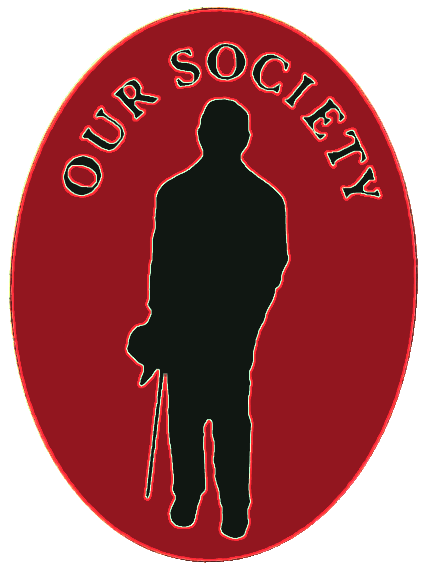
Our Society - Founded 1903
Connoisseurs of Crime
"The club’s dignity, its pride in its history, its endless curiosity about all matters criminal and its furtherance of knowledge in this fascinating area remain unaltered."
Our Society
"It has long been an axiom of mine that the little things
are infinitely the most important ."
Sir Arthur Conan Doyle
Presentations
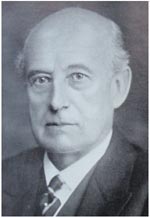 |
Throughout the twentieth century, some of the most distinguished men and women professionally involved with crime in all its various disciplines, contributed original talks, lectures and discussions at Our Society gatherings. These off the record and often intimate insights into the 'crimes of the times' became one of the more popular activities of our group. Here we list those of which a record still remains. Many of the presenters names and reputations have survived the century in which they earned their fame.
As far as is known no paper was read at any of the first six dinners, on 5/12/1903, 24/1/1904, 8/5/1904, 17/7/1904, 27/11/1904 and 19/2/1905. An alfresco meeting, arranged by S. Ingleby Oddie, subsequently HM Coroner for Central London, was held on 19/4/1905, when Members were escorted to the sites of the Whitehapel Murders by three City of London detectives; they were also taken to Petticoat Lane, Jews’ fowl-slaughtering houses, and a doss-house. Professor John Churton Collins noted in his diary:‘Conan Doyle seemed very much interested, particularly in the Petticoat Lane partof the expedition, and laughed when I said, “Caliban would have turned up his nose at this.”
Jump to the most recent Presentations >>
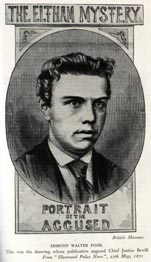 |
21/5/1905: The Edmund Pook Murder Case (Eltham, 1871)
J.B. Atlay
10/12/1905: The Merstham Tunnel Mystery (The death of Mary Sophia
Money, September 1905; ‘open’ inquest verdict)
Professor John Churton Collins
25/2/1906: The Peasenhall Murder
The Rev. Samuel Jones
20/5/1906: The Crick Tunnel Case (the death of Mlle. Lily Rochard,
January 1906: 'open' inquest verdict)
Professor John Churton Collins
18/10/1906: An Attempt to Blackmail Me
Sir Max Pemberton
20/1/1907: The Bravo Poisoning Case
J.B. Atlay
12/5/1907: Mrs Rosa Kowen (twice tried for the murder of her husband at
Norwich; both juries disagreed)
Dr Herbert Crosse and Sir Ernest Wild KC
(Mrs Kowen’s counsel);
12/5/1907: The Edalji Case (horse-maiming)
(This was the first meeting at which guests were present)
Sir Arthur Conan Doyle
17/11/1907: Lord Cochrane (found guilty of fraud);
The Druce-Portland Heredity Case
Walter Stewart, George R Sims
16/02/1908: The Rising Sun Murder Case (Robert Wood)
S. Ingleby Oddie
3/5/1908: The French Bluebeard: Gilles de Retz
R.W.Rose
15/11/1908: The Harvard Case
(the murder of Dr Parkman by Professor Webster)
H.B. Irving
14/2/1909: The Wadhurst Case 1905 (James Stevens was convicted of the
murder of his mother at Pook Pit, Wadhurst, but was reprieved.)
Sir Ernest Wild KC (who had defended Stevens)
16/5/1909: The Salisbury Case (the murder of Teddy Haskell, 1908)
J.B. Atlay
21/10/1909: The Attempted Murder of Mr. Birkin at Tangiers (Hubert Birkin
a drunkard who was heir to his grandfather’s vast fortune, was
persuaded by Owen Callan, the ne’er-do-well son of an Irish MP,
to borrow £400 p.a. from a money-lender, who was to receive £50,000 when Birkin inherited – or if he died before his
grandfather, from a life assurance policy. Birkin and Callan
travelled to a hotel in Tangier, where the latter, impatient for his
share of the money-lender’s profit struck Birkin on the head with
a life preserver – and when the dazed victim tried to escape from
the hotel, fired several shots at him, one of which caused a fleshwound
in Birkin’s head. Callan was arrested, convicted of
attempted murder, and sentenced to ten years imprisonment; the
money-lender failed to get any refund from the insurance
company, who deemed the policy null and void);
‘Some Curious Facts With Reference to Corpses’
Professor William Wright
27/2/1910: The Marquis de Sade; ‘Responsible and Irresponsible Criminals’
F.W. Rose; Sir Arthur Conan Doyle
29/5/1910: The Penge Murder-by-Neglect Case (the Stauntons. 1877)
J.B. Atley
4/12/1910: Dr Crippen
Professor William Wright
19/2/1911: The Dickman Murder Case
E.A.Mitchell-Innes KC (who had unsuccessfully defended
Dickman at Newcastle Assizes)
28/5/1911: The Letchworth Garden City Case (In 1910, at Hertford Assizes,
Frederick Beeton was acquitted of murder but was jailed for nine
months for ‘unlawfully and contemptuously’ burying the body of
his illegitimate baby daughter on an allotment.)
Sir Ernest Wild KC (who had defended Beeton)
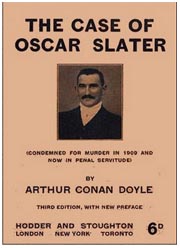 12/11/1911: The Oscar Slater Case (Sir Edward Marsall Hall KC, MP, ‘also made a splendid speech and undertook to use his parliamentary influence in the matter’.)
12/11/1911: The Oscar Slater Case (Sir Edward Marsall Hall KC, MP, ‘also made a splendid speech and undertook to use his parliamentary influence in the matter’.)
Sir Arthur Conan Doyle
11/2/1912: The Croydon Poisoning Case (Richard Brinkley, 1907)
Sir Willoughby Maycock
26/5/1912: The Great Yarmouth Murder Case, 1901
Sir Edward Marshall Hall KC, MP (who had unsuccessfully
defended Herbert Bennett)
10/11/1912: The Maybrick Poisoning Case (‘The venue had been changed
from the Hotel Great Central to the Hotel Cecil owing to the
manager Mr. W. Kaiser migrating from the former to the latter
hotel. The change was generally approved of.’)
H.B. Irving
9/2/1913: The Road House Mystery (Constance Kent)
Sir Willoughby Maycock
4/5/1913: No paper read: a collection of relics was shown
Gerald Biss
23/11/1913: No paper read: causerie on the Edalji and Oscar Slater cases
(opened by) Sir Arthur Conan Doyle
8/12/1914: The Seddon Poisoning Case (From the essay ‘Enjoyment of Murder’ by the Scottish crime historian, William Roughead, ‘Henry James, unfortunately for himself was not a member of ‘Our Society’ – an association of amateurs that would have delighted De Quincey… I had given him my impressions of one such symposium, when [as a guest] I sat between Marshall Hall and “H.B.” [Irving], and the address was on the Seddon case…
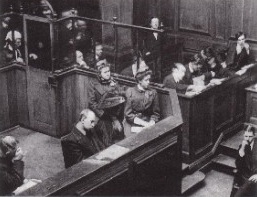 |
“I find it in me to wish verily that I had been present,” he wrote! I could, perhaps, presumptuously, have so felt it in me to be at that fond criminological feast of which you give me so appetizing an account. I have never in my long life had the good fortune of a chance of talk with a great defender or arraigner of murderers – and there bare such things I should have liked to ask of Marshall Hall for instance, especially perhaps to that prodigious young man – a glassmaker’s designer, or something of that sort…and who was so amazingly acquitted and acclaimed in consequence. I want always to know what happens to such glorified persons afterwards: their escape is so much more interesting than their punishment.” It was that night my privilege to hear from Marshall Hall himself the story of Robert Wood, whom he saved from conviction of the Camden Town murder, well and widely known as “The Rising Sun” case which is that referred to by Mr. James [see 16/2/08].’
Filson Young and Sir Edward Marshall Hall KC, MP (who
had unsuccessfully defended Frederick Seddon)
10/5/1914: No paper read: causerie on the murder of Willie Starchfield,
1914 (opened by) George R Sims; one of the speakers was E.G. Hemmerde KC, who had successfully defended the victim’s
father.
8/11/1914: No paper read: causerie on ‘War Incidents’; Impromptu:‘My Black Magic’ Theory of the Whitechapel Murders, as
submitted at the time to Scotland Yard.
Arthur Diosy
(From Inquest [1938], the memoirs of the Central London Coroner, S. Ingleby Oddie: ‘Diosy [as well-known author, lecturer, linguist and student of the occult, who in 1888 had been commissioned by the Star newspaper to make on-the-spot investigations into the Whitechapel murders] thought they were the work of some practitioner of "Black Magic". According to him, amongst the quest of these people in the East is the elixir vitae, one of the ingredients of which must come from a recently killed woman. Diosy got quite excited when he heard of the bright farthings and burnt matches, which he said might have formed the “flaming points” of a magical figure called a “pentacle” at each end of which such points were found, and, according to ritual, certain “flaming” articles had to bethus disposed. Diosy said later that he had paid a visit to Scotland Yard to place his theories before the authority, but had been received without enthusiasm, as one can well understand.’)
7/2/1915: The Battersea Flat Mystery (murder of the actor Weldon
Atherstone in 1910)
Ernest Bowen Rowland
2/5/1915: No paper read: causerie
Lord Dufferin, Sir Arthur Conan Doyle, H.B. Irving, et al.
7/11/1915: The Brides-in-the-Bath Case
J.B.Harris-Burland and Sir Edward Marshall Hall KC, MP
30/1/1916: No paper read: causerie
(opened by) Lord Dufferin
7/5/1916: The Newquay Mystery (Marion Nowill, the young wife of a
wealthy Sheffield cutler, had spent most of November 12 at a
hotel in the Cornish seaside resort: and so had James Delay, who, though only in his 40s, had retired as a solicitor. They were on very friendly terms – till something happened which caused Mrs
Nowill to break the relationship. Clearly distressed, she walked to
the cliffs. As she had not returned by nightfall, a search was organized – during which, Delay, walking along the edge of the
cliffs with the chief Coastguard, suddenly went berserk, shouting
at the officer and fighting with him, apparently with the
intention of pulling him, locked in his grasp, on to the rocks
below. Delay returned to the hotel, but next day he was found
dead in his room, hanging from pairs of braces attached to a
hook. A week later, Mrs Nowill’s body was washed ashore. By
then, it was known that Delay had recently made a codicil to his
will, leaving Mrs. Nowill £30,000 [the equivalent of more than £1m today] – also that, though he had insisted that he was a
bachelor, he had been secretly married for about a year to a
woman whose divorce he had previously arranged, with himself
as co-respondent under the name of Arty Daly!)
(‘As a dramatic denouement, the speaker introduced his cousin, Commander H.C. West, RN, who was the Coastguard who narrowly escaped with his life in the struggle with Delay on the cliffs. Also, Colonel George Cornwallis-West [recently divorced from the actress, Mrs Patrick Campbell] described how, according to a Natal paper, he had been shot in the Tower as a spy.’)
Sir Willoughby Maycock
5/11/1916: What is a Crime?
Ernest Bowen-Rowlands
14/1/1917: The Mannings Murder Case, 1849
C.D. Gordon (‘who had kindly come forward at the last
moment as a substitute for Marshall Hall, who was indisposed’)
6/5/1917: Dr Crippen (’Marshall Hall was at his very best, but Mr. Young’s conception of Crippen’s character was opposed to official records. The licensing laws precluded any discussion as, at 11 p.m., Marshall Hall had only just concluded his oration.’)
Filson Young, and Sir Edward Marshall Hall KC, MP
11/11/1917: Charles Peace
Sir Willoughby Maycock
10/2/1918: Three Little-Known Murders in South Wales (’During the discussion, the character of the remarks made by Mr. G.H. Gardner and his guest, Mr. George Graves, was the object of much criticism, accentuated as it was by being a time of war. It was the first instance in the annals of the Society of such an incident.’)
Ernest Bowen-Rowlands
5/5/1918: Crime at Six Fronts (‘A truly wonderful extempore oratorical effort lasting an hour and a half. Sir Arthur Conan Doyle also narrated some of his experiences as the various fronts.’)
Arthur Diosy
10/11/1918: The Stafford Case, 1908
Sir Edward Marshall Hall KC, MP (who had successfully
defended Edward Lawrence on the charge of murder)
2/2/1919: Aristocratic Criminals (Lord Macclesfield, Lord Ferrers,
the Duchess of Kingston, and Lord de Ros)
Sir Theobald Mathew
11/5/1919: In Favour of “The Unwritten Law” (The other speakers were on the whole opposed to it.’)
Ernest Bowen-Rowlands
30/11/1919: The Pyschic in Crime
Sir Arthur Conan Doyle
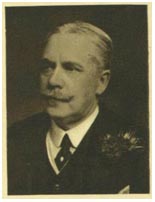 |
1/1/1920: Unpublished Incidents in the Last Moments of Famous
Criminals
Sir Willoughy Maycock and Sir Edward Marshall Hall KC, MP
30/5/1920: Mrs Jessie McLachlan (Glasgow, 1862) (‘Subsequently, Colonel George Cornwallis-West spoke on the state of Ireland.’)
Filson Young
14/11/1920: The Greenwood Poisoning Case
J.B. Harris-Burland
6/2/1921: The Ardlamont Mystery (Monson, 1893)
Ernst Bowen-Rowlands
1/5/1921: Should Women Serve on Juries? (‘An admirable exposition of opposing the innovations, and vehemently supported by the eminent members of the medical profession present; indeed, all the speakers were in complete accord with the reader of the paper.’)
Sir Ernest Wild KC, MP
6/11/1921: The Adolf Beck Case (of mistaken identity)
Sir Theobald Mathew
5/2/1922: The Latterday French Bluebeard (Landru)
H.S. Simmons
7/5/1922: The Law of Not-Proven
J Robertson-Christie K.C. (Clerk to the Scottish Justiciary)
12/11/1922: Abortion
Sir George Turner
6/5/1923: The Sidney Street Affray (’A remarkable effort by so young a member – one of the founders of “The Thugs,” the Oxford “Our Society”.’)
S.R. Hughes-Smith
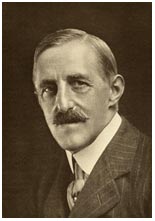 |
4/11/1923: Flogging
Sir Max Pemberton
3/2/1924: A Danish Murder Trial (at which the speaker had recently assisted): differences between Scandinavian and British legal
procedures
Oswald Hickson
4/5/1924: Some Famous Naval Mutinies
Admiral Sir E. Inglefield
2/11/1924: The Death of Marsh Ashford (near Birmingham, 1817)
(The meeting decided by an overwhelming majority that her death was accidental.)
Sir John Hall Bt.
1/2/1925: The Murders on the Spanish Train, April 1924 (Two postal
workers were killed during a mail robbery; within a month,members of the gang were convicted – and two of them executed.)
General Eric Rudkin
3/5/1925: Le Crime Passionel
Dr G. de Vine
1/11/1925: The Oscar Wilde Case
Sir Charles Russell, Bt. (who was the Marquess of
Queensberry’s solicitor)
14/2/1926: Dr Neill Cream
W. Teignmouth-Shore
2/5/1926: The Vaquier Case (Byfleet, 1924)
W.Teignmouth-Shore and R.H. Blundell (who had ‘devilled’ in
the case)
14/11/1926: Gerald Chapman, the American gunman (at whose recent
execution the speaker had been present)
Captain Gilbert Frankau
6/2/1927: Police Methods
(‘The address was unfortunately marred by the narration of three salacious stories at the end, quite irrelevant to the subject. Moreover, nine years ago, at the meeting of 10 Feb 1918, the speaker had told one of them, and Sir Arthur Conan Doyle had strongly objected as his son [afterwards killed in the War] was present as his guest. Sir Arthur was so incensed at the repetition that when he left he said he would never dine with the Society again. It is to be hoped that he will reconsider this decision.’)
G.H.Gardner
1/5/1927: Witchcraft
Sir Max Pemberton
13/11/1927: The Merrett Case (Edinburgh, 1926)
(‘A wonderful tour de force – and a veritable triumph of mind over matter, the speaker being obviously in a certain condition … There was a little breeze between Sir George Turner, in the chair, and Sir Arthur Conan Doyle owing to the latter’s deviating from the subject of the paper in the case of Oscar Slater.’)
Craigie Aitchison KC (who had successfully defended Merrett
on the charge of matricide)
5/2/1928: ‘Court Favourites’: ranging from Elizabeth I to George IV,
and in certain details touching upon royal perversions.
Lord Hylton
1/5/1928: The Stella Maris Case (Alfonso Smith, Whitstable, 1926)
Oswald Hickson
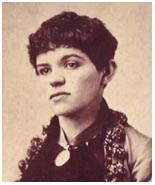 |
18/11/1928: The Pimlico Poisoning Case (Adelaide Bartlett, 1886)
(‘It lasted over an hour and then had to be curtailed; consequently,the subsequent speeches were fewer than usual. As a result, in the motion of Sir George Turner, it was decided in future to hold dinners at 7.30 p.m. rather than 8pm.’)
Sir George Turner
23/2/1929: Bolshevism
(‘The speaker had been a prisoner of and sentenced to death by the Reds while acting in Russia as Agent to the Caucasus.)
Major G.M. Goldsmith
5/5/1929: The Last Word on Oscar Slater (‘It was really a double speech, with Sir Arthur Conan Doyle
intervening.’)
Craigie Aitchison KC (who has presented Slater’s appeal)
17/11/1929: The Phoenix Park Murders, 1882 (‘A wonderful exposition followed by English and Irish oratory to match – though perhaps certain observations by Mr. Maurice Healy were inopportune.’)
Sir Theobald Mathew
2/2/1930: The Case of ‘Mr. A’ (A really wonderful story of credulity on the part of the mysterious blackmailed Indian Prince [Maharaja Sir Hari Singh]; the reader was even able to produce the two cheques for £350 for the Society’s inspection.)
Oswald Hickson
4/5/1930: The Underworld of America
Major Ian Hay Beith
16/11/1930: Mary Queen of Scots
Sir George Turner
8/2/1931: Crime in Fiction (‘A remarkably clever satire on the modern average detective novel.)
Captain Gilbert Frankau
10/5/1931: Sexual Abnormality (‘A delicate topic, handled with remarkable skill, but the subject did not please everybody.’)
Dr Harold Dearden
15/11/1931: The Rouse Case (‘A marvellous paper, followed by Sir Bernard Spilsbury, who, with the victim’s calcined jaw in his hand, held the company spellbound.’)
Dr W.F. Eberlie
14/2/1932: The Sheffield Cellar Crime of 1928
J. Willoughby Jardine KC (who had successfully defended
Armitage)
8/5/1932: The Case of the Cambridge Undergraduate (In 1931, Douglas
Potts, of Kings College, shot dead his tutor and a police sergeant
and then himself.)
Sir Bernard Spilsbury
20/11/1932: Mrs Elvira Barney (‘A delicate and somewhat dangerous theme[as Mrs Barney had only recently been acquitted of murder], but handled with great dexterity by the speaker. The rumours that Government interference might occur proved groundless.’)
Captain Gilbert Frankau
5/2/1933: The Poisoned Partridge Case (the death of Lieutenant Hubert
Chevis, 1931 (‘A Clear statement providing that there was no crime and that the famous “Hooray, Hooray, Hooray” telegraph was a pure
though remarkable coincidence.’)
F.A. Memory
14/5/1933: The Samuel Furnace Case (Kentish Town, 1933)
(‘The reader had been personally identified with the elucidation of the crime, which seemed to emulate the Rouse Case.’)
Dr T.F. Taylor
19/11/1933: The Doping of Race Horse (‘The exposition was enhanced by the eloquence of certain members of the Jockey Club, which was strongly represented.’)
Oswald Hickson
25/2/1934: The Double Murder near Guildford (murder of Mr. & Mrs Keen
at Puttenham, 1932; originally thought to be a murder and
suicide; later Geoffrey Nobes was charged but acquitted).
(‘Major Ian Hay Beith and Mr P.G. Wodehouse left early,
presumably because one or two of the gruesome exhibits proved too much for them.’)
W.H.C. Romanis
13/5/1934: The Reginald Hinks Murder Case, 1933
(‘The two speakers left no doubt the in the minds of their audience that Hinks was justly hanged … Prior to the paper, Mr. Arthur
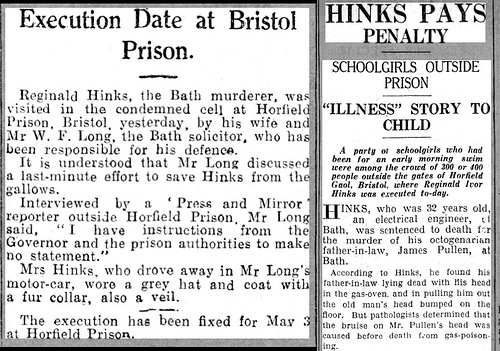
18/11/1934: Four Communist Dynamitards (Johannesburg)
('It was a subject that treated of Psychopathia Sexalis, in that
the Psychopathia was the cause that led to the crime, and thespeaker endeavoured on that account to obtain sympathy for the
four miscreants. The subsequent speakers did not furnish the sympathy, with the possible exception of Lord Feversham, who
was most eloquent.')
Sir Alexander Erskine Hill, Bt., KC
2/2/1935: The Ardlamont Mystery, 1893
Sir Alexander Erskine Hill Bt., KC
12/5/1935: Rex v. Sorenson
(During his appeal against conviction for the murder of a woman in Paddington, Frederick Sorenson, a native of South Shields, abandoned his case; he was subsequently reprieved.)
E.L. Cadwell-Smith
3/11/1935: The French Police
Francis Grierson
2/2/1936: Matricide in Margate: the Sidney Fox Case 1929
Viscount Jowitt, PC (who, as Attorney-General, had led for the Crown)
10/5/1936: The Rattenbury and Stoner Murder Case (100th Dinner)
Sir Reginald Croom-Johnson (who led for the Crown)
8/11/1936: Dr Buck Ruxton
Sir Norman Birkett KC (who had unsuccessfully defended Ruxton)
7/2/1937: Espionage
H.S. Simmons
9/5/1937: Peter Kurten, the Mass-Murderer of Dusseldorf
Dr Macdonald Critchley
7/11/1937: The Death of Sir Edmund Godfrey, 1678 (Titus Oates)
Sir Bernard Spilsbury
8/5/1938: 'Hysterical Women'
Dr Harold Dearden
13/11/1938: The Cuddies Strip Murder Case (Perthshire, 1935)
John Cameron KC (who had appeared for the Crown)
5/2/1939: The Casserley Case, 1938
(Edward Royal Chaplin, acquitted of the murder of Percy Casserley but found guilt of his manslaughter)
G.B. McClure KC
7/5/1939: The Dartmoor Mutiny, 1932
Samuel Jones
8/5/1943: Absenteeism in Schools
Sir Percy Everett
29/11/1943: The Green Scarf Case
(In 1938, a Folkestone prostitute, Phyllis Spiers, was found manually strangled to death on common land; for some reason, a green scarf had been wrapped around her neck. William Whiting, an unemployed labourer, was tried for the crime at the Old Bailey, but, probably because of uncertainty about the date of the murder, was acquitted.)
John Maude KC
18/6/1944: The Tranby Croft (Baccarat) Case 1890
Eveleigh Nash
6/5/1945: Tony Mancini, the Alleged Brighton Trunk Murderer
Dr Macdonald Critchley
28/10/1945: The Mystery of Peter the Painter
J.P. Eddy KC
12/5/1946: William Joyce: 'Lord Haw-Haw'
Derek Curtis-Bennett KC (who had appeared for the Defence)
6/10/1946: The Trial of Patrick Hartney (for the murder of his young and promiscuous wife; acquitted)
Anthony Hawke
16/2/1947: The Nuremberg Trials
Sir David Maxwell Fyfe KC, Lord Goddard, Sir Geoffrey Lawrence KC et al
26/10/1947: The Chalk Pit Murder (Ley and Smith)
Gerald Howard (who had been one of Ley's counsel)
6/6/1948: The Trial of James Camb (the Gay Gibson case)
G.D. Roberts KC (who had led for the Crown)
31/10/1948: The Murder of the Greek King's Housekeeper
(Arthur Boyce, found guilty of murdering Elizabeth McLindon, was executed in 1946)
Henry Elam (who had appeared for the Crown)
- N.B. From here till 1975 there are lacunae in the records.
3/4/1949: The Parliament Murder
J.D. Casswell KC
31/10/1949: The Murders of Dr Marcel Petiot (guillotined in 1946)
Dr Macdonald Critchley
25/10/1951: Lilliput Murder
Arthur Davies
27/4/1952: The Murder of a Cabinet
(In 1947, U Saw, a former Prime Minister of Burma, and others killed six members of the Burmese Executive Council; all of those charged were found guilty, but some were reprieved from the death sentence.)
Derek Curtis-Bennett KC (who had defended U Saw at the trial in Rangoon
26/11/1952: The Case of Daniel Raven
(executed in 1950 for the murder of his parents-in-law at their home in Edgware)
Henry Elam (who had appeared for the Crown)
1/11/1953: Rex v Alfred Moore
(found guilty of the murder of two policemen near Huddersfield in 1951; executed in 1952)
Sir Theobald Mathew
11/7/1954: 'The Body in the Divan'
(In 1953, Teresa Conroy, charged with murdering her epileptic son whose body she had stuffed into a divan-base, was found Guilty but Insane.)
Elliot Gorst QC (who had defended Mrs Conroy)
31/10/1954: The Montagu Case
(which was largely responsible for the setting up of 'The Wolfenden Commission'.)
G.D. Roberts QC (who had led for the Crown)
7/10/1956: ?
William Latey QC
11/11/1956: The Great Safe-Breaking Conspiracy
The Hon. Ewen Montagu QC (who had led for the Crown)
3/2/1957: Scratching the Race-Horses
(the Bath horse-'switching' case, 1954)
R.E. Seaton QC
5/5/1957: No paper read: causerie on 'London After Dark'
(opened by) Dr Macdonald Critchley
3/11/1957: No paper read: causerie on the Wolfenden Report
(opened by)
Mr. Justic Elwes
2/2/1958: An Unusual Murder Case
(In 1956, Freeman Reese, a Negro deserter from the US Army, was tried at Stafford for the murder of a Burton-on-Trent policeman ten years before. He was acquitted but was subsequently found guilty of desertion
by a US court-martial and sentenced to a term of hard labour.)
Sir Robert Micklethwaite QC
4/5/1958: Which Man Killed Him?
Sir Frederick Pritchard
2/11/1958: Off-Stage Murder
Sir Hugh Griffiths
8/2/1959: The Body in the Boat
Harold Brown QC
3/5/1959: The Murder of Patricia Curran
(allegedly by Ian Hay Gordon, Ulster, 1952)
Dr Desmond Curran
8/11/1959: The Scarlett Widow (Marguerite Steinheil, acquitted of the
murder of her husband and her mother in Paris, 1908;
afterwards married Robert Scarlett, heir to the title of Baron
Abinger)
Ernest Dudley
7/2/1960: Guenther Podola (Murderer of Det. Sgt. Raymond Purdy in
1959; his claim that he was amnesiac raised the question of
whether or not he was fit to plead.)
J.P. Eddy QC
1/5/1960: The Infamous Conduct in a Professional Respect
Cyril Hardy QC
6/11/1960: The Pen Club Murder Case (Stepney, 1960)
Victor Durand QC (who had defended one of the three
accused)
5/2/1961: What is Murder? (In 1960, ‘Gipsy Joe’ Smith, a petty thief,
was found guilty of murdering a PC who was killed when Smith
drove off as the PC approached him in Woolwich; on appeal the
sentence was reduced to manslaughter, but the House of Lords
reinstated the trial verdict,)
Edward Clarke QC (who had defended Smith)
7/5/1961: The Evans and Christie Cases
Ludovic Kennedy
5/11/1962: The Affair at Crimea Cottage, Lincolnshire
Michael Evelyn
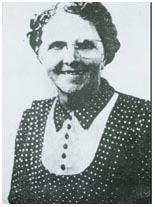 |
4/2/1962: The Mummy of Rhyl (In 1960, a mummified body,
subsequently identified as that of Mrs Frances Knight, was discovered in a house at Rhyl, North Wales; the tenant of
the house, Mrs Sarah Harvey was acquitted of murder but convicted of fraud.)
Sir Francis Walshe
6/5/1962: The Case of the Girl Guides (In 1961, after being found guilty
of the rape of a Girl Guide at Twickenham, Arthur Albert Jones
was convicted of the murder of another Girl Guide, Brenda
Nash, of Heston.
Norman Brodrick QC
(who had defended Jones at the murder trial)
4/11/1962: The A6 Murder (Hanratty)
Graham Swanwick QC (who had led for the Crown)
3/2/1963: ‘Reprieve from Death Sentences’
Fenton Bresler
28/5/1963: The Ruislip Spy Case (the Krogers, 1962)
(The Diamond Jubilee Dinner.)
Mervyn Griffith-Jones QC (who had appeared for the Crown)
3/11/1963: Who Turned on the Gas-Tap? (The death of Michael Teahan, Holloway 1962)
Professor Francis Camps
2/2/1964: The Other Side of the Wall
Gilbert Hair (prison governor)
6/6/1964: Broadmoor
Dr Patrick McGrath (Medical Superintendent at Broadmoor)
1/10/1964: The Haigh Case
Edgar Lustgarten
7/2/1965: The Great Train Robbery
Joseph Grieves QC (who had defended Thomas Wisbey)
2/5/1965: The Challoner (police corruption) case
Ken Richardson
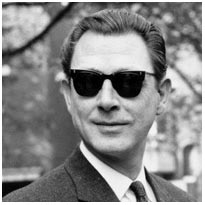 |
22/10/1965: The Stephen Ward Case
James Burge QC (who had defended Ward) and J.B. Wheatley
(Ward’s solicitor)
13/2/1966: Alfred Hinds (Found guilty of robbery from Maples’s furniture
store in 1953, he made several escapes from prison, ostensibly so
as to clear his name; though granted early release following an
illogically successful libel action against a retired detective who
had stated that Hinds was guilty of the robbery, the conviction
was not quashed.)
J.P. Comyn QC (who had conducted Hinds’s libel action)
8/5/1966: The Croydon Poisonings (the Duff-Sidney Case, 1928-9)
Richard Whittington-Egan
20/11/1966: West-Country Blackmail
O. Nugent
5/2/1967: A Staffordshire Mystery
J.F. Milward
15/5/1967 ?
Professor Francis Camps
5/11/1967: Bobby Connelly, The Mitcham Murderer
Lewis Hawser QC
4/2/1968: The Red-Mini Murder Case (Reading, 1967)
Brian Gibbens QC (who had led for the crown)
5/5/1968: The Killing of Julia Wallace (Liverpool, 1931)
Dr Gavin Thurston
27/11/1968: The Chelsea Arsenic Case, 1967 (William Barnett, a nightwatchman
at the Chelsea College of Science and Technology, died from arsenic in his tea [and that of colleagues, who
recovered], no one was charged.)
Dr Gavin Thurston
9/2/1969: A Great Quack (John Long, who, in the early 1830s, was twice
tried for the manslaughter of customers who had died from his ‘remedies’.)
Evan Stone
4/5/1969: The Case of Signalman Frost (A young BR signalman working at
Abbots Ripton, Cambs., having found a way of circumventing
safety-checks, caused the derailment of the Flying Scotsman,
which resulted in at least one death. Charged with manslaughter,
he was tried at Nottingham Assizes, where the defence was that ‘it was all an unfortunate accident’. After several days of
complicated technical evidence, Frost changed his plea to Guilty
to the lesser offence, the manslaughter charge was not pursued,
and Frost was sentenced to two years’ imprisonment.
Michael Davis QC (who had led for the Crown)
2/11/1969: Crime in the Metropolis
Sir Robert Mark (Commissioner of the Metropolitan Police)
1/2/1970: A Cambridge Murder (1921; Thomas Clanwaring was acquitted
of the murder of a shopkeeper, Mrs Alice Lawn.)
Master Colin Clayton
3/5/1970: Two Prosecutions for One Murder (In 1960, an eleven-year-old
boy was acquitted of the recent murder of Iris Dawkins, aged
nine, in Southampton; in 1968, a man named Ridley, fourteen
years old at the time of the murder, was found guilty of it.
Sir Norman Skelhorn QC (who defended at the first trial – and,
as DPP, had instructed the prosecution lawyers at the second)
1/11/1970: The Cannock Chase Murder (Raymond Morris, 1967)
Deputy Assistant Commissioner Ian Forbes of New Scotland
Yard (who, as a detective superintendent attached to the ‘Murder
Squad’, had directed the investigation.)
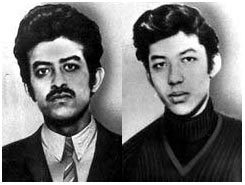 |
7/2/1971: The McKay Kidnapping and Murder Case (the Hosein brothers,
1970)
Douglas Draycott QC
(who had unsuccessfully defended Nizamodeen Hosein)
22/5/1971: Fleet Street Secrets (In 1970, at the Old Bailey, the Sunday Telegraph, its editor, an Army officer, and Jonathan Aitken,
prospective Tory Parliamentary candidate for Thirsk, were tried
under the Official Secrets Act for receiving and/or the
communicating of information in a confidential report to the
UK Government on the Nigerian civil war; all of the defendents
were acquitted, and the OSA was amended soon afterwards.)
Basil Wigoder QC (who had defended Jonathan Aitken)
14/11/1971: Champagne Charlie
H H Judge Jack Abdela QC
20/2/1972: The Kray Twins
David Hopkin
7/5/1972: The Man Who Never Was
(The 1st ‘Ladies’ Night)
The Hon. Ewen Montague QC
5/11/1972: The Thalium Poisoning Case (Graham Young, 1971)
John Leonard QC
11/2/1973: Permissive Problems
Christopher Bourke
6/5/1973: The Murder of Angus Sibbet (Northumberland, 1967; Dennis
Stafford and Michael Luvaglio were found guilty of the crime)
Lewis Hawser QC
(who had conducted Stafford’s unsuccessful appeal)
5/11/1973: Was She Alive?
H H. Judge Brian Gibbens QC
4/2/1974: The Armstrong Poisoning Case (Hay-on-Wye, 1921)
Robin Odell
2/6/1974: Making Money (In 1968, Reuben Silver, who had thought up an
imaginative, though laborious way, of making a dozen fivers
from eleven with the aid of scissors and sticky tape, was
convicted and sentenced [by Judge King-Hamilton] to eight
years’ imprisonment. Some time later, Fenton Bresler, who had
defended Silver on the currency charge, visited the European
Court of Human Rights and was surprised to see his former
client’s name on the Court List. He discovered that Silver was
suing the prison authorities for not providing him with kosher
food. Such were the delays in the European Court, that Silver
had completed his sentence and died before the case was heard.
H H Judge Henry Pownall QC (who had prosecuted Silver on behalf of the Bank of England)
1/12/1974: The Archer-Shee (‘Winslow Boy’) Case
The Hon Ewen Montague QC
2/2/1975: The Trials of Brian Donald Hume
Ivan Butler
4/5/1975: The Tichborne Claimant
Christopher Bourke
3/11/1975 ?
3/2/1976: The Burning of Evelyn Foster (Northumberland, 1931)
Jonathan Goodman
4/5/1976: Jack the Ripper
Robin Odell
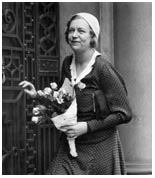 |
2/11/1976: Mrs Elvira Barney (1932)
Peter Cotes
13/2/1977: The Black Panther (Donald Neilson, 1976)
Gilbert Gray QC (who had unsuccessfully defended Neilson)
3/5/1977: The Janie Jones (‘Vice Queen’) Case
H H Judge Alan King-Hamilton QC
(who had presided at the trial)
20/10/1977: IRA Bombings
Commander Roy Habershon of New Scotland Yard
7/2/1978: Witchcraft and the Law (including the case of a heart being sent
through the post.
Detective Superintendent John Harvey Grant of Bedfordshire
Constabulary
6/3/1979: A Riddle of Maggots: The Lydney Murder Case, 1964
Professor Keith Simpson
12/6/1979: Oscar Wilde (The discussion period was enlivened by a breeze
between a guest, Lord [C.P.] Snow and Sir Norman Skelhorn, which finally blew over when the latter stalked out of the room.)
Dr Macdonald Critchley
6/11/1979: Advocate v Artist (In 1882-4, at the last trial in Westminster
Hall, continuing as the first case to be heard in the new Law
Courts in the Strand, Richard Belt, a fashionable sculptor, won a
libel action against Charles Lawes, also a sculptor, who had
claimed that not all of Belt’s pieces were his own work.)
Richard Du Cann QC
4/3/1980: The Great Train Robbery
H H Judge Michael Argyle QC
(who had defended Leonard Field)
24/6/1980: Dr Emil Savundra (insurance swindler, sentenced to
imprisonment and fined, in 1968.)
H H Judge Alan King-Hamilton QC
(who had presided at the trial)
25/11/1980: Reminiscences
Lord Denning
8/3/1981: The Tick-Tock Murder Case (In 1974, at Leicester Castle, 23-year-old Albert Edward Taylor was found guilty of the murder of
Jacqueline Seston, the 15-year-old sister of his girl-friend, at her
home in Peterborough. As a crucial part of his alibi, he claimed
that his attention had been drawn to the time shown on a
railway-station clock by the clicking of the minute-hand’s
movement: but this had been rebutted by evidence that the
clock was silent. Subsequently, however, it was learned that the
clock did click when the weather was cold, as it had been on the
day of the murder. After two appeals, the conviction was
quashed.)
H.H. Judge Edwin Jowitt QC (who had led the prosecution)
19/11/1981: The Resident informant
Deputy Assistant Commissioner David Powis of New
Scotland Yard
19/11/1981: Some Miscarriages of Justice
Ludovic Kennedy
28/3/1982: The Michelle Booth Case (On a night in 1978, Miss Booth was
attacked and thrown from a Reading-to-London train; when
found the following day, she was scarcely alive, but she made a
remarkable recovery. Mainly on the basis of purported
confessions, Alan Westlake, who was educationally subnormal,
was tried at the Old Bailey for attempted murder.)
John W Rogers QC (who had successfully defended Westlake,
the judge having upheld his submission that the purported
confessions had been obtained improperly and were therefore
inadmissible)
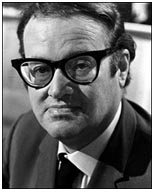 |
9/11/1982: Clinging to the Wreckage (Reminiscences)
John Mortimer QC
29/3/1983: The Nurse of Saudi Arabia (the Helen Smith inquest)
Sir David Napley (HRH the Duke of Edinburgh was present)
11/12/1983: The Calvi Case (Murder or Suicide)
George Carman QC
27/3/1984: Three Spies (The Krogers and George Blake)
H.H. Judge Cox (who, as a solicitor, had acted for all three)
6/11/1984: The Brighton Trunk Crimes
(The First Dinner at the Imperial.)
Jonathan Goodman
12/3/1985: The Charfield Rail Disaster, 1928
Roger Wilkes
